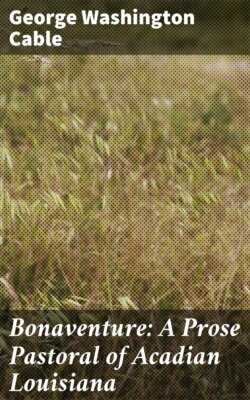Читать книгу Bonaventure: A Prose Pastoral of Acadian Louisiana - George Washington Cable - Страница 6
На сайте Литреса книга снята с продажи.
SOSTHÈNE.
ОглавлениеTable of Contents
Bayou Teche is the dividing line. On its left is the land of bayous, lakes, and swamps; on its right, the beautiful short-turfed prairies of Western Louisiana. The Vermilion River divides the vast prairie into the countries of Attakapas on the east and Opelousas on the west. On its west bank, at its head of navigation, lies the sorry little town of Vermilionville, near about which on the north and east the prairie rises and falls with a gentle swell, from whose crests one may, as from the top of a wave, somewhat overlook the surrounding regions.
Until a few years ago, stand on whichever one you might, the prospect stretched away, fair and distant, in broad level or gently undulating expanses of crisp, compact turf, dotted at remote intervals by farms, each with its low-roofed house nestled in a planted grove of oaks, or, oftener, Pride of China trees. Far and near herds of horses and cattle roamed at will over the plain. If for a moment, as you passed from one point of view to another, the eye was shut in, it was only where in some lane you were walled in by fields of dense tall sugar-cane or cotton, or by huge green Chickasaw hedges, studded with their white-petalled, golden-centred roses. Eastward the plain broke into slight ridges, which, by comparison with the general level, were called hills; while toward the north it spread away in quieter swells, with more frequent fields and larger houses.
North, south, east, and west, far beyond the circle of these horizons, not this parish of Lafayette only, but St. Landry, St. Martin, Iberia, St. Mary’s, Vermilion—all are the land of the Acadians. This quarter off here to northward was named by the Nova-Scotian exiles, in memory of the land from which they were driven, the Beau Bassin. These small homestead groves that dot the plain far and wide are the homes of their children. Here is this one on a smooth green billow of the land, just without the town. It is not like the rest—a large brick house, its Greek porch half hid in a grove of oaks. On that dreadful day, more than a century ago, when the British in far-off Acadie shut into the chapel the villagers of Grand Pré, a certain widow fled with her children to the woods, and there subsisted for ten days on roots and berries, until finally, the standing crops as well as the houses being destroyed, she was compelled to accept exile, and in time found her way, with others, to these prairies. Her son founded Vermilionville. Her grandson rose to power—sat in the Senate of the United States. From early manhood to hale gray age, the people of his State were pleased to hold him, now in one capacity, now in another, in their honored service; they made him Senator, Governor, President of Convention, what you will. I have seen the portrait for which he sat in early manhood to a noted English court painter: dark waving locks; strong, well-chiselled features; fine clear eyes; an air of warm, steady-glowing intellectual energy. It hangs still in the home of which I speak. And I have seen an old ambrotype of him, taken in the days of this story: hair short-cropped, gray; eyes thoughtful, courageous; mouth firm, kind, and ready to smile.
It must have been some years before this picture was taken, that, as he issued from his stately porch—which the oaks, young then, did not hide from view as they do now—coming forth to mount for his regular morning ride, a weary-faced woman stood before him, holding by the hand a little toddling boy. She was sick; the child was hungry. He listened to her tale. Their conversation was in French.
“Widow, are you? And your husband was a Frenchman: yes, I see. Are you an Acadian? You haven’t the accent.”
“I am a Creole,” she said, with a perceptible flush of resentment. So that he responded amiably:—
“Yes, and, like all Creoles, proud of it, as you are right to be. But I am an Acadian of the Acadians, and never wished I was any thing else.”
He found her a haven a good half-day’s ride out across the prairies north-westward, in the home of his long-time acquaintance, Sosthène Gradnego, who had no more heart than his wife had to say No to either their eminent friend or a houseless widow; and, as to children, had so many already, that one more was nothing. They did not feel the burden of her, she died so soon; but they soon found she had left with them a positive quantity in her little prattling, restless, high-tempered Bonaventure. Bonaventure Deschamps: he was just two years younger than their own little Zoséphine.
Sosthène was already a man of some note in this region—a region named after a bird. Why would it not often be well so to name places—for the bird that most frequents the surrounding woods or fields? How pleasant to have one’s hamlet called Nightingale, or Whippoorwill, or Goldfinch, or Oriole! The home of Zoséphine and Bonaventure’s childhood was in the district known as Carancro; in bluff English, Carrion Crow.
